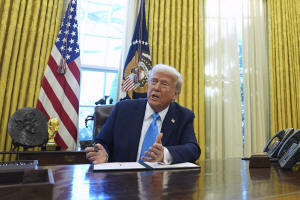As Trump pushes the limits of presidential power, the courts push back
 Send a link to a friend
Send a link to a friend
 [February 07, 2025]
By CHRIS MEGERIAN and LINDSAY WHITEHURST [February 07, 2025]
By CHRIS MEGERIAN and LINDSAY WHITEHURST
WASHINGTON (AP) — A familiar pattern has emerged since President Donald
Trump returned to the White House less than three weeks ago: He makes a
brash proposal, his opponents file a lawsuit and a federal judge puts
the plan on hold.
It's happened with Trump's attempts to freeze certain federal funding,
undermine birthright citizenship and push out government workers.
Now the question is whether the court rulings are a mere speed bump or
an insurmountable roadblock for the Republican president, who is
determined to expand the limits of his power — sometimes by simply
ignoring the laws.
Although Democrats may be encouraged by the initial round of judicial
resistance, the legal battles are only beginning. Lawsuits that
originated in more liberal jurisdictions like Boston, Seattle and
Washington, D.C., could find their way to the U.S. Supreme Court, where
a conservative majority has demonstrated its willingness to overturn
precedent.
“What’s constitutional or not is only as good as the latest court
decision,” said Philip Joyce, a University of Maryland public policy
professor.
Roughly three dozens lawsuits have already been filed, including by FBI
agents who fear they're being purged for political reasons and families
who are concerned about new limitations on healthcare for transgender
youth.

The spotlight on the judiciary is brighter because the
Republican-controlled Congress has essentially abdicated its role of
serving as a check on the presidency. Lawmakers from Trump's party have
acceded to his demands to unilaterally cut spending and fire government
watchdogs without proper notice.
That leaves only the courts as a potential guardrail on the president's
ambitions.
“We’re down to two branches of government," said Justin Levitt, a
professor at Loyola Law School.
The latest setbacks for Trump came Thursday.
In Seattle, U.S. District Judge John Coughenour blocked Trump's
executive order on birthright citizenship, which was intended to prevent
the children of parents who are in the country illegally from being
automatically considered Americans.
Coughenour described birthright citizenship, which was established by
the 14th Amendment, as “a fundamental constitutional right” and he
assailed Trump in scathing terms.
“The rule of law is, according to him, something to navigate around or
simply ignore, whether that be for political or personal gain,” said the
judge, who was nominated by President Ronald Reagan in 1981.
“There are moments in the world’s history where people look back and
ask, ‘Where were the lawyers? Where were the judges?’" Coughenour added.
“In these moments, the rule of law becomes especially vulnerable. I
refuse to let that beacon go dark today.”
The judge had previously called the order “blatantly unconstitutional”
when issuing a temporary ruling.
“I’ve been on the bench for over four decades," Coughenour said then. “I
can’t remember another case where the question presented was as clear as
this one is.”
Also on Thursday in Boston, U.S. District Judge George O’Toole Jr.
paused Trump's plan to encourage federal workers to resign by offering
them paid leave.

[to top of second column]
|

President Donald Trump speaks to reporters as he signs executive
orders in the White House on Tuesday, Feb. 4, 2025, in Washington.
(AP Photo/Evan Vucci, File)

O'Toole, who was nominated by President Bill Clinton in 1995, did
not express an opinion on the deferred resignation program, which is
commonly described as a buyout. He scheduled a hearing for Monday
afternoon to consider arguments.
"We continue to believe this program violates the law, and we will
continue to aggressively defend our members’ rights,” American
Federation of Government Employees National President Everett Kelley
said in a statement.
The White House said at least 40,000 federal workers have already
agreed to quit in return for being paid until Sept. 30.
“We are grateful to the judge for extending the deadline so more
federal workers who refuse to show up to the office can take the
administration up on this very generous, once-in-a-lifetime offer,"
White House press secretary Karoline Leavitt said in a statement.
It's unclear which legal battles will reach the U.S. Supreme Court,
where justices can choose what cases to consider. But Trump has
nominated three out of nine members, and the court has taken an
expansive view of presidential power.
In a case involving criminal charges against Trump, the justices
ruled that presidents are immune from prosecution for any official
actions taken during their term.
Sonia Sotomayor, one of the few liberal justices on the bench, said
the ruling would make the U.S. president “a king above the law.”
Steve Vladeck, a professor at Georgetown University Law Center, said
the courts have been pushing back on Trump in his second term. But
he warned that judicial decisions need to be enforced.
“The collapse of any congressional pushback, any congressional
responsibility, I think is an ominous sign for what would happen if
this administration starts openly defying court orders," Vladeck
said.
Historically, that would be a political non-starter and leave a
president vulnerable to impeachment. But Trump was acquitted by the
U.S. Senate despite two House impeachments from his first term, and
then reelected by American voters, leaving him with little fear of
punishment.

One closely watched legal issue involves the president's ability to
withhold funding authorized by Congress, a practice known as
impoundment. Although it's restricted by legislation passed in 1974,
after scandals involving former President Richard Nixon, some of
Trump's allies have described the law as an unconstitutional limit
on White House authority.
The concept was tested by Trump when the Office of Management and
Budget decided to freeze federal grants and loans while the
administration conducted an ideological review of spending.
The directive was blocked by U.S. District Judge Loren AliKhan, who
was nominated by President Joe Biden in 2023.
“Defendants’ actions in this case potentially run roughshod over a
‘bulwark of the Constitution’ by interfering with Congress’s
appropriation of federal funds,” AliKhan wrote.
____
Associated Press writer Nicholas Riccardi contributed reporting from
Washington.
All contents © copyright 2025 Associated Press. All rights reserved |